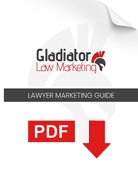
Introduction
A well-crafted website is not just a fancy addition; it’s an absolute necessity for real estate lawyers like you. Your website acts as your online store, the first impression potential clients get of your law business. Think of it as the elegant entrance of a stunning skyscraper that radiates professionalism and expertise.
However, it’s crucial to understand that not all websites are the same. Simply having a website isn’t sufficient; it should be thoughtfully and strategically designed to stand out in a fiercely competitive market. That’s why, in this article, we will explore the top 10 vital components to consider when creating a website specifically for your real estate law practice.
We recognize that your time is precious, and you’re committed to enhancing your marketing efforts. That’s why we’ll provide clear, practical advice to help you make informed decisions about your website design. From the look and functionality to the user experience and search engine optimization, we’ll cover all the essentials.
So, get ready to delve into the key factors that will transform your website into a powerful tool for attracting and converting potential clients. Let’s dig in and lay the groundwork for a website that not only showcases your professionalism and expertise but also helps you succeed in the competitive realm of real estate law.
Professional Appearance
Your website is the online face of your real estate law practice, and it must leave a strong first impression. When visitors arrive at your site, it should immediately convey professionalism and reflect the high standards you uphold in your work. A clean and contemporary design is crucial for achieving this.
To create a professional website, it’s important to pick a color scheme, fonts, and layout that align with your brand identity. Think about the colors that represent your law practice. Choose a color palette that is visually appealing and conveys trust and reliability. Opt for fonts that are easy to read, modern, and consistent across your website.
The layout of your website plays a vital role in projecting professionalism. A cluttered and disorganized layout can suggest chaos and a lack of attention to detail. In contrast, a well-organized layout with clear navigation fosters trust and confidence in your services. Ensure your website is easy to navigate, with a logical flow of information and user-friendly menus.
Remember, first impressions matter. Potential clients will form an opinion about your practice within seconds of landing on your website. By investing in a professional appearance that mirrors your expertise and attention to detail, you can leave a lasting impact and encourage visitors to explore further.
Mobile Responsiveness
Mobile responsiveness is now a crucial aspect of website design for real estate lawyers.
With the majority of web users accessing sites from mobile devices like smartphones or tablets, it’s vital to have a website that’s optimized for different screen sizes. A mobile-friendly site adapts seamlessly to offer an excellent user experience for all visitors, regardless of the device they’re using.
Remember, first impressions matter. Potential clients will form an opinion about your practice within seconds of landing on your website. By investing in a professional appearance that mirrors your expertise and attention to detail, you can leave a lasting impact and encourage visitors to explore further.
A mobile-responsive website ensures that potential clients can easily browse and engage with your content on any device. It also enhances accessibility, especially when potential clients are on the move and lack access to a desktop computer. This accessibility adds significant value to your practice, making it easier for potential clients to access valuable information about your services.
Furthermore, mobile responsiveness is also crucial for SEO. Google prioritizes mobile-friendly sites in its search results, and mobile responsiveness is now considered one of the key factors for better search engine rankings. A responsive design can boost your website’s visibility and draw more potential clients to your practice.
User-Friendly Navigation
When creating a website for your real estate law practice, one of the most important things to consider is how easy it is for people to get around. Potential clients should be able to find the information they need quickly and easily. A straightforward and intuitive navigation system is key to keeping visitors interested and reducing the number of people who leave your site without exploring it.
Start by making sure that your main menu is easy to spot, preferably at the top of your website. Visitors should be able to easily find and access the main pages of your site from the menu. Don’t overwhelm them with too many options, as this can lead to confusion and frustration. Instead, focus on the most important sections and keep your menu simple.
To make navigation even more user-friendly, use clear and simple labels for each page or section. Labelled sections or tabs help visitors understand right away what they can expect to find on each page. This makes it easier for them to move around your site, helping potential clients find the specific information they’re looking for.
Consider organizing your content in a logical order, with the most important and relevant information easily accessible from the homepage or main menu. By structuring your website in this way, you can improve the user experience and encourage visitors to explore further.
Remember, the goal is to make it as easy as possible for potential clients to find the information they need to decide whether to hire your real estate law services. By prioritizing clear and intuitive navigation, you can create a positive user experience that sets you apart from your competitors.
Clear Call-to-Actions (CTA)
When it comes to turning website visitors into potential clients, Calls to Action (CTAs) are a fundamental part of your real estate law practice’s website.
A CTA is a prompt that encourages visitors to take a specific action, like scheduling a consultation, asking for more information, or downloading helpful resources. Placing compelling and well-designed CTAs strategically throughout your website can significantly increase visitor engagement and lead to more conversions.
To create effective CTAs, it’s crucial to make them clear, enticing, and visually appealing. Use persuasive language that explains the value of the action you want visitors to take. For instance, instead of a generic “Contact Us” button, consider using phrases like “Schedule Your Free Consultation Now” or “Get Expert Advice Today.”
Where you place your CTAs is also important. You can include them prominently on your homepage, in the header or footer, or within relevant content sections. Also, think about putting CTAs at the end of blog posts or resource pages, where visitors are likely looking for more information or solutions to their real estate law needs.
Well-designed CTAs should stand out visually from the rest of your website and use eye-catching colors, fonts, and buttons to get visitors’ attention. Use contrasting colors that match your website’s design and guide visitors’ focus toward the CTA.
By strategically placing compelling and well-designed CTAs throughout your website, you can encourage visitors to take action and engage more with your law practice. Craft persuasive and visually appealing CTAs that motivate potential clients to connect with you in a meaningful way, ultimately leading to more conversions for your real estate law practice.
Relevant and Engaging Content
Content is a cornerstone of website design for real estate lawyers, and it plays a critical role in showcasing your expertise and setting you apart from your competitors. Information-rich and captivating content is essential for attracting potential clients and building trust in your services.
When crafting the text for your website, it’s essential to keep it concise yet compelling. Clearly communicate the benefits and unique advantages of working with your firm. Highlight your experience, relevant qualifications, and success stories to demonstrate your expertise in real estate law. Use language that resonates with your target audience and addresses their concerns and challenges.
In addition to persuasive copy, incorporating case studies can be highly effective in establishing credibility. Showcase successful cases or transactions you’ve handled in the past, providing concrete examples of your ability to resolve complex real estate issues. Case studies not only inspire confidence in potential clients but also illustrate your practical experience.
Testimonials are another potent tool for building trust. Positive feedback from satisfied clients helps potential clients recognize the value you bring. Include testimonials on your website, spotlighting the positive experiences and outcomes of your previous clients.
Adding a blog to your website is also an excellent way to offer valuable insights, share industry knowledge, and position yourself as an authority in real estate law. Consistently updating your blog with informative and relevant articles helps attract and engage potential clients. It also shows that you’re up to date with the latest developments in the field, establishing you as a knowledgeable professional.
By presenting informative and engaging content, using case studies and testimonials, and maintaining an active blog, you can establish your credibility, showcase your expertise, and connect with potential clients. Quality content not only enhances your website’s design but also plays a crucial role in converting visitors into clients.
Search Engine Optimization (SEO)
Search engine optimization (SEO) is crucial for increasing your online visibility and attracting potential clients to your real estate law practice’s website.
SEO involves optimizing your website to ensure it ranks high in search engine results for relevant keywords and phrases. By implementing SEO best practices and creating content that resonates with your target audience, you can significantly boost organic traffic to your website.
One vital aspect of SEO is the use of keywords. Conduct comprehensive keyword research to identify the words and phrases potential clients use to find real estate law services. Integrate these keywords naturally throughout your website’s content. Avoid excessive keyword use, which can lead to search engine penalties, and focus on creating informative and engaging content with natural keyword usage.
Meta tags are another critical part of SEO that can impact your website’s visibility in search engine results. These tags provide information about your website’s content to search engines and can enhance your website’s relevance to specific search queries. Ensure your meta tags are informative, concise, and accurately represent the content on your website.
Optimizing page load times is also crucial for improving user experience and ranking high in search engine results. A slow-loading website can result in high bounce rates, reducing your chances of attracting potential clients. Techniques like compressing images and videos, minimizing the use of large files, and utilizing a content delivery network (CDN) are effective ways to reduce page load times and offer an excellent user experience.
Incorporating SEO best practices in your website design can enhance your website’s visibility in search engine results. When optimized correctly, your website can drive more organic traffic, increasing your chances of attracting potential clients. By conducting thorough keyword research, creating informative meta tags, and optimizing page load times, your website can be more competitive in the online market, resulting in significant growth in terms of new users and clients.
Integration of Social Proof
Establishing trust and credibility is vital when it comes to attracting potential clients to your real estate law practice. One effective way to demonstrate your reputation is by showcasing social proof on your website. Social proof includes client testimonials, online reviews, and client success stories that illustrate the positive experiences and outcomes of working with your firm.
Testimonials from satisfied clients can be a potent tool for building trust. Showcase them prominently on your website, ideally on the homepage or a dedicated testimonials page. Highlight the positive feedback and experiences of your clients, emphasizing how your services helped them overcome challenges and achieve their goals. Including client names, photos, and even video testimonials can further enhance the authenticity and impact of the social proof.
Online reviews from platforms like Google, Yelp, or industry-specific directories can also help establish credibility. Display positive reviews on your website or link to external review sites. Encourage satisfied clients to leave reviews, as they can serve as valuable endorsements to potential clients who are researching your services online.
Client success stories can further reinforce your expertise and track record of achieving favorable outcomes for clients. Showcase specific cases or transactions that you’ve successfully handled, highlighting the challenges you faced and the solutions you provided. Genuine and detailed success stories demonstrate your capability and give confidence to potential clients who may be dealing with similar real estate issues.
By incorporating social proof, such as testimonials, online reviews, and client success stories, you can build trust and credibility with potential clients visiting your website. The positive feedback and experiences from previous clients act as endorsements, giving potential clients confidence in your services and fostering a sense of reliability. Showcasing social proof prominently on your website can significantly influence their decision to choose your firm for their real estate law needs.
Intuitive Contact Information
Making it straightforward for potential clients to get in touch with you is crucial for turning leads into clients. To ensure accessibility, prominently display your contact information on your website, ideally in the header or footer of every page. Include multiple ways to contact you, such as phone numbers, email addresses, and, if applicable, a physical address.
Incorporate a contact form on your website, allowing visitors to reach out to you easily. The form should be user-friendly, with clear fields and a simple submission process. Request only essential information to avoid overwhelming potential clients and discourage them from reaching out.
Additionally, consider offering live chat support. This feature enables visitors to engage with you in real time, addressing their inquiries immediately. Live chat provides a more convenient and personalized experience, increasing the chances of converting leads into clients.
When designing your website, ensure that the contact information is responsive across different devices, including mobile phones and tablets. Many potential clients browse the internet using their mobile devices, so it is crucial to provide a seamless and user-friendly experience for all users.
By making your contact information clear, incorporating a user-friendly contact form, and offering multiple channels of contact, you maximize the opportunities for potential clients to reach out to you. This ease of communication can significantly increase your chances of converting leads into satisfied clients.
Integration of Live Chat
Live chat offers an immediate and convenient way for website visitors to get their questions answered or start a conversation, creating a positive user experience.
With live chat, you can interact with potential clients in real time, addressing their inquiries promptly. This instant communication allows you to provide more personalized assistance, building trust and rapport with visitors. By actively responding to their needs and concerns, you can significantly increase the chances of converting them into clients.
Live chat also empowers you to proactively engage with visitors and offer assistance. By monitoring their behavior on your website, such as the pages they visit or the time spent on specific pages, you can identify potential opportunities for engagement. For example, if a visitor spends a significant amount of time on your service page, you can initiate a chat to inquire if they need further information or have any questions.
Moreover, live chat can enhance the overall user experience on your website. Instead of having to hunt for contact information or wait for an email or phone response, visitors can receive immediate assistance through live chat. This convenience and responsiveness leave a positive impression and can set you apart from competitors who don’t offer live chat support.
Analytics and Tracking
Incorporating analytics and tracking tools on your website is vital for effectively monitoring and optimizing its performance. One of the most widely used and robust analytics tools is Google Analytics, which provides valuable insights into visitor behavior, traffic sources, and conversion rates.
Through analytics tools, you can gain a deeper understanding of how visitors interact with your website. You can track metrics such as the number of visits, page views, bounce rates, and average time spent on each page. This data enables you to identify which pages are performing well and which may need improvement. For example, a high bounce rate on a specific page may suggest that visitors are struggling to find what they’re looking for. Armed with this information, you can make targeted changes to enhance user experience and content relevance.
Analytics tools also offer insights into traffic sources, showing which channels are driving visitors to your website. This information helps you identify the most effective marketing strategies. For instance, you can evaluate the performance of your social media campaigns, email marketing efforts, or search engine optimization (SEO) activities. By understanding which channels generate the most traffic and leads, you can allocate your marketing resources more efficiently.
Conversion tracking is another critical aspect of analytics.
By setting up goals and tracking conversions, you can gain insight into how visitors engage with your website and how many take desired actions, like completing a contact form or subscribing to a newsletter. Understanding conversion rates and the factors that influence them allows you to optimize your website to increase the likelihood of converting visitors into clients.
When it comes to designing a website for real estate lawyers, the little things matter a lot. It’s crucial to pay close attention to the design and functionality of your website to ensure it effectively represents your law practice and draws potential clients. By including these top 10 elements on your website, you can create a compelling online presence that truly distinguishes your law practice from the competition.
Keep in mind that your website is often the initial impression potential clients have of your law practice. Therefore, it’s essential to make a positive and lasting impression by using high-quality visuals and branding, user-friendly navigation, and engaging content that answers visitors’ questions and establishes your authority in your field.
Conclusion
Investing in a well-designed website is an investment in the growth and success of your real estate law firm. By taking the time to create a website that caters to your clients’ needs and conveys your brand’s value, you will enhance your firm’s ability to attract, engage, and ultimately convert potential clients into loyal ones. A well-designed website can help you establish a robust online presence, build trust with potential clients, and position your firm as a leader in your field.
Discover 10 ideas for marketing your Real Estate Law Firm.
Need help with website design for your law firm? Contact the Gladiator Law Marketing team. For over 10 years we have been helping real estate law firms grow with actionable, data-driven marketing strategies. Our track record speaks for itself, with a remarkable 95% client retention rate. From award-winning websites to high-ROI SEO, PPC and Social Media campaigns, Gladiator Law Marketing can help your law firm stand out in a crowded marketplace. Contact us at 888-683-3212.







